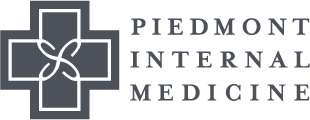Cardiovascular Care

Heart disease is a catch-all phrase for a variety of conditions that affect the heart's structure and function. Coronary heart disease is a type of heart disease that develops when the arteries of the heart cannot deliver enough oxygen-rich blood to the heart. It is the leading cause of death in the United States.
Symptoms of coronary heart disease may be different from person to person even if they have the same type of coronary heart disease. However, because many people have no symptoms, they do not know they have coronary heart disease until they have chest pain, a heart attack, or sudden cardiac arrest.
The physicians of Piedmont Internal Medicine specialize in the prevention and diagnosis of coronary heart disease. We believe patients need to understand their risk of heart disease so we can create a plan to manage these risk factors and prevent heart disease.
Common Risk Factors of Coronary Heart Disease
- Smoking
- High blood pressure
- High blood cholesterol
- Diabetes
- Being overweight or obese
- Physical inactivity
- Family history of heart disease
Coronary Heart Disease Screening & Diagnosis
To screen for or diagnose coronary heart disease, your doctor will assess risk factors to help evaluate your risk of developing coronary heart disease. Possible screenings and tests include:
- Blood pressure readings to see whether you have high blood pressure.
- Calculation of your body mass index and waist circumference to see whether you have an unhealthy weight.
- Blood tests to see whether you have high blood cholesterol, high blood triglycerides, or diabetes.
- Nuclear Stress Testing to check how your heart works during physical stress.
- Performing an ultrasound of any of the following:
- the heart - an echocardiogram, allows physicians to view your heart
- the arteries in the neck - a carotid ultrasound shows doctors the arteries in the neck
- the abdominal aorta - a abdominal aorta ultrasound allows physicians to examine main blood vessel leading away from the heart
Treatments for Coronary Heart Disease
If you have coronary heart disease, your doctor will recommend heart-healthy lifestyle changes, medicines, surgery, or a combination of these approaches to treat your condition and prevent complications.
Your doctor may refer you to a cardiologist if
- The severity of your risk factors appears to put you at significant risk of heart attack or stroke,
- The lifestyle modifications you are trying and the medications you have been taking to control your risk factors are not successful,
- You have a history of congestive heart failure, heart attacks or atrial fibrillation.

